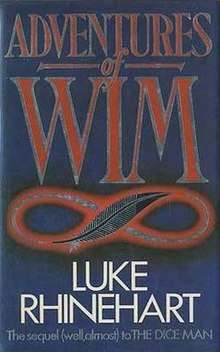Adventures of Wim
Adventures of Wim is a book by George Cockcroft, a career English professor,[1] written under the pen name Luke Rhinehart. It was first published in 1986, and was represented, by its author, as "The sequel, well almost, to The Dice Man". This original version is no longer in print; a "major reworking" of the book, from the same author, is now what appears as Whim (2002).
 First edition (UK) | |
| Author | Luke Rhinehart |
|---|---|
| Country | United States |
| Language | English |
| Genre | Comedy, Philosophical novel |
| Publisher | Grafton Books (UK) & AuthorHouse (USA) |
Publication date | 22 May 1986 (UK as "Adventures ..." 27 November 2002 (USA as "Whim") |
| Media type | Print (hardback & paperback) |
| Pages | 320 pp (hardback edition) (orig UK) & 452 p. (hardback edition) (USA revised) |
| ISBN | 0-246-12769-4 (hardback edition) (orig UK) & ISBN 1-4033-4799-9 (hardback edition) (USA revised) |
| OCLC | 13124910 |
Plot summary
The book is composed of sections taken from other, fictional books. The preface to the book claims that it was written in Deya, Majorca, in 2326. According to the book, an entire industry has grown up publishing books about a Montauk named Wim - including The Gospel According to Luke (Luke Forth, not Luke Rhinehart) and the screenplay of a movie. The screenplay is possibly in there as a result of Luke Rhinehart's continuing frustration in trying to get The Dice Man turned into a good movie. Adventures of Wim, then, is an effort to create a new interpretation of the story of Wim, drawing on the many previous efforts, and so providing a multi-faceted and whimsical account of 'one of the greatest figures in the 20th and 21st Century'.
A boy is born of a virgin mother and is named "Wim" (in Adventures of Wim) or "Whim" (in The Book of the Die and Whim): Montauk for "Wave Rider". He is pronounced to be the saviour of the Montauk nation by his tribe's navigator, and educated in their ways including the "Montauk martial arts" which are predicated on not engaging with, nor even being noticed by an enemy. Sadly, the humans steal him away and attempt to educate him in more useful skills, such as American Football. Wim, also known as "He of Many Chances", proves to be an inefficient saviour, as God sends him on a quest for Ultimate Truth. This does not seem to be something that will benefit his tribe terribly, but the navigator isn't one to stare down the barrel of a lightning gun, and sends him on his way. After a long and arduous search, Wim finds ultimate truth (in a potato), and with it the cure for the sickness of the human condition.
Main themes
This book contains a much more open view of philosophy than Cockroft's previous books. The book ties in to the views of The Dice Man, but in a softer and more accepting way, and with more paths to enlightenment.
Literary significance & criticism
Release details
- 1986, UK, Grafton Books ISBN 0-246-12769-4, Pub date 22 May 1986, hardcover (as Adventures of Wim)
- 1987, UK, Grafton Books ISBN 0-586-06752-3, Pub date 19 November 1987, paperback (as Adventures of Wim)
- 2002, USA, AuthorHouse ISBN 1-4033-4799-9, Pub date 2002, hardcover (as Whim)
- 2002, USA, AuthorHouse ISBN 1-4033-4798-0, Pub date 2002, paperback (as Whim)
References
- Carrère, Emmanuel (7 November 2019). "Who is the Real Dice Man? The Elusive Writer Behind the Disturbing Cult Novel". The Guardian. Retrieved 7 November 2019.
'Psychiatrist? Psychoanalyst?' George repeats, as surprised as if I had said cosmonaut. No, he was never a psychiatrist, he has been a college English teacher all his life... / Really? But on the cover of his book... / George shrugs as if to say, editors, journalists, you know, there is almost nothing they won’t write... / From Hudson we drive for about an hour; he handles the wheel with an abruptness that contrasts with his good humour and makes his wife laugh. It is moving to see how the two love each other, and when Ann tells me in passing that they have been married for 50 years, I am not surprised. / They live in an old farmhouse with a yard that slopes down to a duck pond. They have three grown boys, two of whom live nearby. One is a carpenter and the other is a housepainter; the third still lives at home. He is schizophrenic, Ann tells me matter-of-factly; he is doing fine at the moment, but I shouldn’t worry if I hear him speaking a bit loudly in his room, which is right beside the guest room where I will be staying.
- The Times, London.
- Belfast Telegraph.
- Bestsellers.